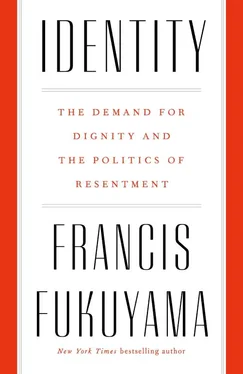Senghor, Léopold
separatist movements
sexual violence
shame
Shas (Israel)
Sincerity and Authenticity (Trilling)
Singapore
slavery; defense of
Smith, Adam
Smith, Alan
Snow Crash (Stephenson)
Social Contract, The (Rousseau)
socialism; decline of
social media
society; minimal common culture necessary to; as primary to identity; Rousseau on development of; as secondary to identity
Socrates
Somalia
soul; see recognition; self, inner; thymos
South Africa; constitution of
South Korea
Spain; Catalonia and
Sri Lanka
Stalin
Stanford University
state, role of
Stephenson, Neal
Sterling, Bruce
Stern, Fritz
Strauss, David
sub-Saharan Africa; economy of
Sufferings of Young Werther (Goethe)
Sweden
Switzerland
Syria; politicized religion in; refugees from
Talladega Nights
Tanzania
Taylor, Charles
Tea Party
Thailand
Thaksin Shinawatra
Thatcher, Margaret
Theory of Moral Sentiments, The (Smith)
therapeutic model; in academia; backlash to; as new religion; religion’s embrace of; social identities in; the state’s embrace of
thymos; poorly translated as “spirit”; as third part of soul; see also recognition
Tibi, Bassam
Till, Emmett
Tocqueville, Alexis de
Tönnies, Ferdinand
Toward a State of Self-Esteem , (California Task Force to Promote Self-Esteem and Personal Social Responsibility)
transgender movement
Trilling, Lionel
Troeltsch, Ernst
Trotsky, Leon
Trump, Donald: character of; middle-class support for; populism of; Putin and; resentment used by; rise of white nationalism under
Tunisia; Arab Spring in
Turkey; emigrants from; Syria and
Tversky, Amos
UK Independence Party
Ukraine
United States; Anglo-Protestant roots of; assimilation in; borders of; citizenship in; Civil War in; diversity in; economic inequality in; ethnic cleansing of; founding documents of; human potential movement in; immigration to; industrialization in; Islamist violence in; language in; left in; narcissism of; national identity of; nationalism avoided by; nationalism embraced by; noncitizen residents of; political polarization in; poverty in; progress narrative for; Prohibition in; religious conservatism in; resentment of; social movements in; Syria supported by; therapeutic model adopted by; vetocracy in; work ethic in
Universal Declaration of Human Rights
university campuses
urbanization: Islamism created by; nationalism created by; see also modernization
values, shared, see national identity
van Gogh, Theo
van Gogh, Vincent
Vasconcellos, John
Venezuela
vetocracy
Vienna
Vietnam
Voltaire
voting rights
Wales
Walker, Scott
Warren, Rick
Washington, George
Wealth of Nations, The (Smith)
Weber, Max
welfare; in EU; pride and
Western culture, critiques of
white nationalism
Who Are We? (Huntington)
Wilson, E. O.
work ethics
working class; excluded from left; political choices of
World Trade Organization
world wars
Xi Jinping
Yanukovych, Viktor
Yazidi
Yemen
Yingluck Shinawatra
Political Order and Political Decay: From the Industrial Revolution to the Globalization of Democracy
The Origins of Political Order: From Prehuman Times to the French Revolution
America at the Crossroads: Democracy, Power, and the Neoconservative Legacy
State-Building: Governance and World Order in the Twenty-first Century
Our Posthuman Future: Consequences of the Biotechnology Revolution
The Great Disruption: Human Nature and the Reconstitution of Social Order
Trust: The Social Virtues and the Creation of Prosperity
The End of History and the Last Man

Francis Fukuyamais Olivier Nomellini Senior Fellow at Stanford University’s Freeman Spogli Institute for International Studies and Mosbacher Director of its Center on Democracy, Development, and the Rule of Law. He has previously taught at the Paul H. Nitze School of Advanced International Studies at Johns Hopkins University and at the George Mason University School of Public Policy. Fukuyama was a researcher at the RAND Corporation and served as the deputy director for the State Department’s policy planning staff. He is the author of Political Order and Political Decay , The Origins of Political Order , The End of History and the Last Man , Trust , and America at the Crossroads: Democracy, Power, and the Neoconservative Legacy. He lives with his wife in California. You can sign up for email updates here.

https://www.facebook.com/Francis-Fukuyama-202849746405929/

https://twitter.com/fukuyamafrancis
Thank you for buying this Farrar, Straus and Giroux ebook.
To receive special offers, bonus content, and info on new releases and other great reads, sign up for our newsletters.

Or visit us online at
us.macmillan.com/newslettersignup
For email updates on the author, click here.
The author and publisher have provided this e-book to you for your personal use only. You may not make this e-book publicly available in any way. Copyright infringement is against the law. If you believe the copy of this e-book you are reading infringes on the author’s copyright, please notify the publisher at: us.macmillanusa.com/piracy.
Farrar, Straus and Giroux
175 Varick Street, New York 10014
Copyright © 2018 by Francis Fukuyama
All rights reserved
First edition, 2018
E-book ISBN: 978-0-374-71748-3
Our e-books may be purchased in bulk for promotional, educational, or business use. Please contact the Macmillan Corporate and Premium Sales Department at 1-800-221-7945, extension 5442, or by e-mail at MacmillanSpecialMarkets@macmillan.com.
www.fsgbooks.com
www.twitter.com/fsgbooks• www.facebook.com/fsgbooks
Many centuries before Martin Luther, Augustine went through a similar tortured exploration of his inner self in his Confessions . Unlike Luther, however, his writings did not devalue established social institutions or trigger massive upheavals in the politics and society of his time.
Strictly speaking, Luther believed that faith was a gift from God, the result of God’s grace, and was not something that could simply be willed by individuals. The Calvinists carried this doctrine further, believing that individuals were predestined either to be saved or not; they had no agency in the outcome. Nonetheless, under both doctrines faith was a characteristic of the inner self and still enjoined obedience to God’s law, the content of which was not subject to human choice.
Читать дальше


 https://www.facebook.com/Francis-Fukuyama-202849746405929/
https://www.facebook.com/Francis-Fukuyama-202849746405929/ https://twitter.com/fukuyamafrancis
https://twitter.com/fukuyamafrancis











